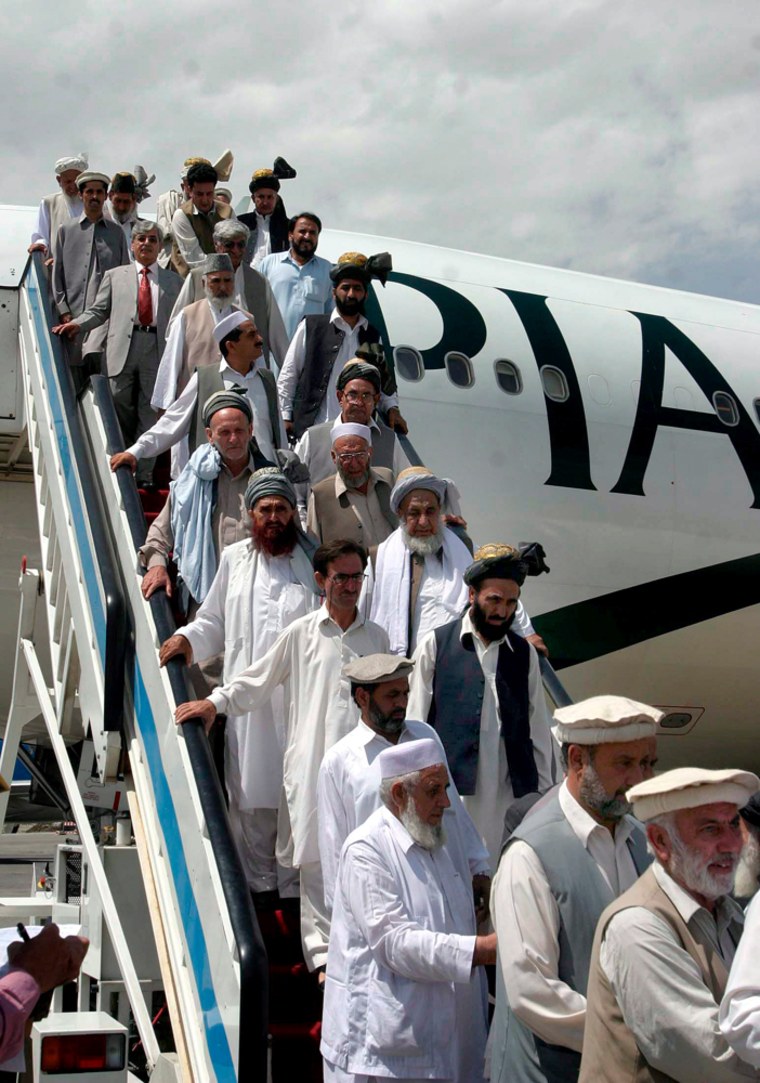Extremism that plagues Afghanistan has crept across the border into Pakistan, President Hamid Karzai said Thursday at the opening of a meeting between more than 600 Pakistani and Afghan tribal leaders.
Karzai expressed hope that the four-day gathering in Kabul would help address security problems in the border regions — where resurgent Taliban militants have stepped up attacks and al-Qaida is feared to have regrouped.
The head of Pakistan’s delegation, Prime Minister Shaukat Aziz, said the future of Pakistan and Afghanistan are intertwined, and that instability in one country affects the other. But he also said Afghanistan needed to address its own insurgency problems and not cast blame on Pakistan.
“Afghanistan is not yet at peace within itself. The objective of national reconciliation remains elusive,” Aziz said. “They can’t blame anyone else for failing to achieve this objective that lies at the heart of their malaise.”
Effectiveness questioned
The effectiveness of the meeting was questioned because Pakistan’s President Gen. Pervez Musharraf pulled out at the last moment, and tribal elders from the most volatile region in Pakistan’s tribal areas are boycotting the event.
Musharraf told Karzai on Wednesday that “engagements” in Islamabad, the Pakistani capital, prevented him from attending.
U.S. State Department Spokesman McCormack said in Washington that the Pakistani government had made it clear that, despite canceling his attendance at the opening of the jirga, Musharraf supports its goals. McCormack said that it is still not clear if Musharraf will attend later parts of the meeting in Kabul.
Officials in Islamabad said Thursday that the government had considered imposing a state of emergency because of security threats, citing deteriorating security in the volatile northwest near the Afghan border, but decided against it.
Afghan officials had shrugged off Musharraf’s decision not to attend, saying that tribal leaders — the ground-level power-brokers in the restive border region — would still attend the meeting, held in the same white tent where the country’s post-Taliban constitution was hammered out in 2004.
Daily woes
Karzai told the jirga, or tribal council, that the meeting’s success will eventually benefit Pakistan. He then described daily woes and suffering that the people of Afghanistan are facing as the Taliban take on government and foreign troops.
“Afghan people are dying daily, our schools are burning, our mullahs are dying,” Karzai said in his 40-minute speech, which was occasionally punctuated by applause. “Our boys and girls have been targeted ... at school.”
He accused militants of abducting and killing women in the name of the Taliban and Islam, while barring the girls from going to school, a trend that is “slowly going to the other side” of the border into Pakistan, Karzai said.
The main focus of the 650 delegates — 350 from Afghanistan and about 300 from Pakistan — will be security and terrorism, but they will also talk about economic development and fighting drugs.
Taliban representatives are not involved.
The idea of the jirga emerged from a September 2006 meeting in Washington between President Bush, Karzai and Musharraf that focused on ways to combat rising border violence.
The Taliban, ousted by U.S.-led forces in late 2001, have stepped up attacks in the past two years. The violence has killed thousands, raising fears for Afghanistan’s fledgling democracy.
U.S. and Afghan officials say Taliban militants enjoy a safe haven in Pakistani border regions, particularly Waziristan, where Washington also fears al-Qaida is regrouping. Pakistan says it has some 90,000 troops battling militants in the region, and that it is not a terrorist haven.
